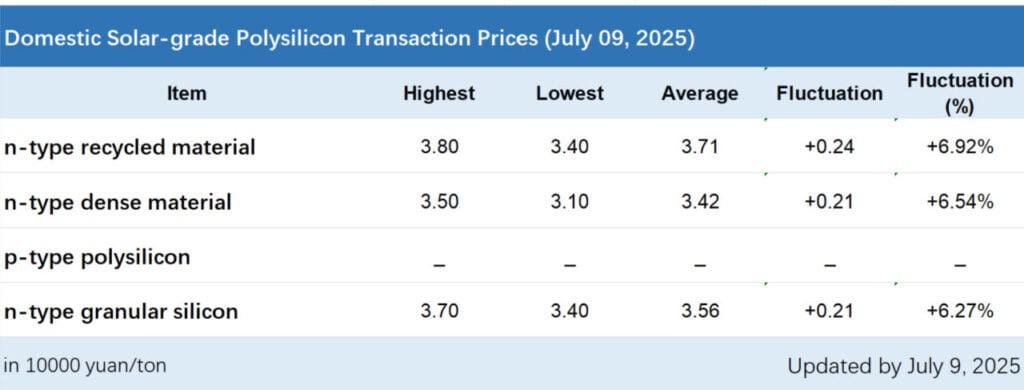
According to the latest pricing data from the Silicon Industry Branch, released on 9 July, the transaction price range for n-type dense polysilicon has oscillated between RMB34,000-38,000/ton (US$4,741-5,299/ton).
On average, the transaction price for n-type dense polysilicon reached RMB37,100/ton, up 6.92% week-on-week. The transaction price range for n-type granular silicon was RMB34,000-37,000/ton, with an average transaction price of RMB35,600/ton, a 6.27% increase from the previous week.
Try Premium for just $1
- Full premium access for the first month at only $1
- Converts to an annual rate after 30 days unless cancelled
- Cancel anytime during the trial period
Premium Benefits
- Expert industry analysis and interviews
- Digital access to PV Tech Power journal
- Exclusive event discounts
Or get the full Premium subscription right away
Or continue reading this article for free
Since the first quarter of 2025, silicon material prices have exhibited a wave-like downward trend. By early July 2025, the average price of n-type dense material had dropped to RMB32,000/ton, while the average price of recycled n-type dense material stood at RMB34,000/ton, both hitting a record low. The price of granular silicon stayed within the range of RMB31,000-32,000/ton, with market transaction prices generally hovering at the lower end of this range.

According to the analysis by the Silicon Industry Branch, the recent price hike in silicon materials is primarily due to polysilicon companies having operated at a loss for over a year. To clear inventory, prices had plummeted far below overall costs. To comply with the “no sales below cost” pricing regulations, silicon material manufacturers have raised prices in a one-time adjustment above the overall cost threshold.
Silicon material market bottomed out
Wafer manufacturers are still adopting a wait-and-see stance in the short term and have not yet accepted the price hike on a large scale. However, according to feedback from Zhihui Solar, several companies have urgently adjusted prices, with increases ranging from 8% to 11.7% across different sizes.
| Price adjustment details for mono wafers (RMB/piece) | |||
| Model | Previous Price | Adjusted Price | Price Increase (%) |
| n-183.75 | 0.9 | 1 | 11.1% |
| n-210R | 1.03 | 1.15 | 11.7% |
| n-210 | 1.25 | 1.35 | 8.0% |
The Silicon Industry Branch stated that while new orders remained limited this week, expectations of price hikes have driven stronger execution of previously signed contracts, with downstream buyers actively pushing for order fulfilment—a stark contrast to the frequent order cancellations observed earlier. This suggests that the silicon material market has bottomed out and is in the process of stabilising.
From a supply chain pricing perspective, while recent silicon material quotations and transaction prices have risen, the sustainability of this price hike remains uncertain, given relatively weak downstream demand in Q3 and expectations of production expansion during the high-water season. The key factor determining whether the price hike can persist lies in the ability of downstream sectors to pass costs onto end-users.
On the capital market front, July 8 saw a rare surge in A-share PV industry stocks, with nearly 30 stocks soaring over 10%. Leading companies across various segments including those in PV glass, inverters, and power supplies—saw a broad-based rally.






